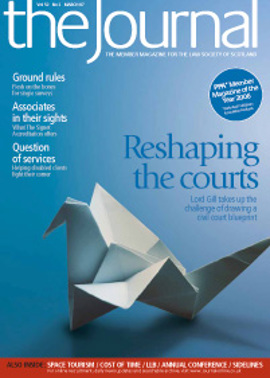Shape of things to come
Since the key IP statutes (the Copyright Designs and Patents Act 1988, the Patents Act 1977 and the Trade Marks Act 1994) were introduced, there has been a technological revolution: the invention and huge personal and business use of the internet, resulting in the digitisation of many aspects of business and society. In December 2006 the Gowers Review, commissioned by the government to determine whether the UK’s IP system was “fit for purpose”, was published.It concluded that the system is operating fairly well but proposed various reforms.
Although significant press coverage was given to the review at the time of its publication, as the Patent Office has now recently published its proposed reform timetable it is worth revisiting the key proposed changes to UK law and IP registration and enforcement procedures, which will also largely apply to Scotland.
Copyright: striking a balance
Advances in technology make copying easier, but also provide rights-holders with increased opportunities to restrict fair use of their works through digital rights management tools (“DRM”). The Gowers recommendations aim to strike a balance between consumers and rights-holders. Key points are:
- a limited exception for format shifting to allow consumers, for example, to upload their own CDs to MP3 players;
- allowing private copying of all forms of content for research purposes;
- proposing to the EU Commission that provision be made for use of orphan works (where copyright owners cannot be traced).
Consultations on these will be launched in 2007 by the Patent Office.
Piracy (making infringing copies of copyright works) is a growing problem in the UK. Technological advances have simplified the process of making and disseminating copies worldwide via the internet. A consultation in spring 2007 will consider increasing the penalties for online infringement in line with those for physical infringement, i.e. 10 years’ imprisonment and/or an unlimited fine.
One recommendation already going live is that s 107A of the Copyright etc Act is to be brought into effect on 6 April 2007. This will give trading standards officers stronger anti-counterfeiting powers to investigate copyright infringements, including making test purchases and entering premises to search for and seize infringing property.
Proposed patent reforms
Key recommendations for patent reform include:
- not extending patent protection beyond current levels to software, business methods and genes;
- clarifying the research exemption from infringement so that future innovation is not stifled.
A preliminary consultation on the research exemption is due to commence this spring.
Efficiency improvements
In his foreword, Gowers notes that for many individuals and businesses “IP is an obscure and distant domain”. Although many businesses are fully aware of the importance of identifying and protecting their IP portfolios, in a large knowledge-based economy such as Scotland it is essential that businesses of all sizes and from all sectors are fully aware of their IP. In order to increase awareness, the Patent Office is to prepare a guide to the IP system to be provided to all newly incorporated companies by Companies House from autumn 2007. The Patent Office will also launch a campaign to raise consumer awareness of IP rights.
Gowers further recommended the introduction of an accelerated grant process for patent applications to provide increased protection for businesses; and a fast track system for trade mark applications, under which trade marks would be examined and accepted within 10 days of application.
It is early days for both of these recommendations but they could result in significant changes.
Resolving IP disputes
The review contains recommendations for making resolution of IP disputes more timely, cost effective and proportionate, including reviewing current court rules, enabling judges to encourage mediation and options for fast-tracking cases. Disappointingly, the review and thus the recommendations relate only to England & Wales. Although the Court of Session is an experienced forum for dealing with UK IP disputes, the proposals will only impact on Scottish practice if similar initiatives are implemented or followed up here.
In a similar vein, Gowers also proposes increased use of the Patent Office dispute resolution procedures as a means of offering patent holders an alternative to court proceedings. To avoid conflicts of interest, a review of current arrangements at the Patent Office to ensure clear separation between staff granting rights and those mediating disputes over their validity/ownership is to take place in spring 2007.
On balance the reforms proposed are sensible and it is encouraging to see the Patent Office taking steps to implement them quickly. However the lack of any focus on Scottish dispute resolution procedures, and the many recommendations to preserve the status quo whilst keeping reform “under review”, suggest that Gowers is a helpful start towards but not the end of IP reform in the immediate future.
Susan Snedden, IP & Technology Department, Maclay Murray & Spens
In this issue
- A look in the mirror
- A welcome review
- Squaring the circle
- Profitability and financial structure
- Access-ability
- Culture change
- Practice? What practice?
- Signet badge takes wing
- Four in one
- Appreciation: Angus McLean
- In on the Acts
- "Lossiemouth, we have a problem"?
- Flagging up VAT
- In the family way
- Practice inside out
- Shape of things to come
- Breaking down a brick wall?
- Playing by the rules
- Scottish Solicitors' Discipline Tribunal
- Website reviews
- Book reviews
- Funny thing
- PIPs' hour approaches
- Enabled in the housing market
- Registers refresher






